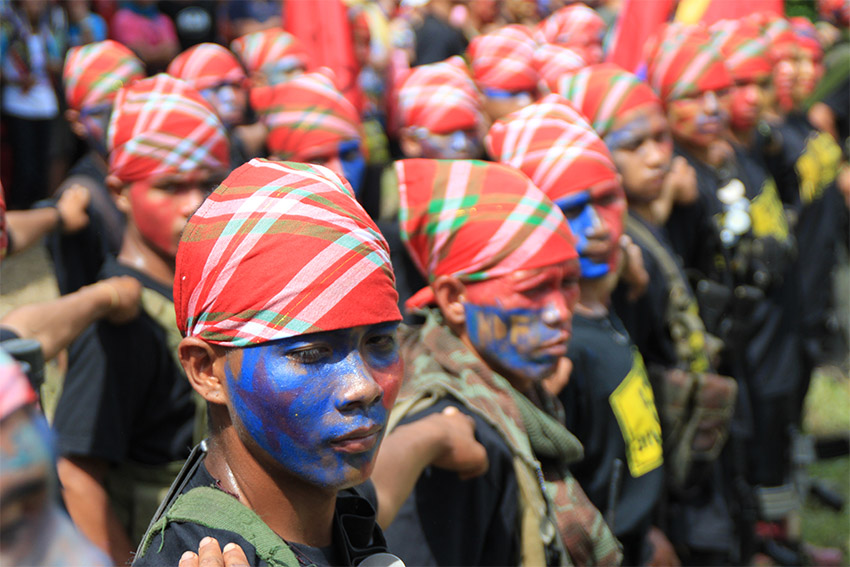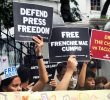
Guerrilla fighters of the New People’s Army prepare their formation at the start of the ceremony for the release of its two captive police officers in a village in Lupon, Davao Oriental on Friday, August 26, 2016. (davaotoday.com file photo)
CAGAYAN DE ORO CITY, Philippines — Contrary to the government’s pronouncement that the New People’s Army (NPA) is already a “spent force” and that the revolutionary movement is expected to be wiped out when President Rodrigo Duterte steps down from office this June, the country’s budget for the defense services has not been reduced but has in fact seen an increase this year.
This was the observation of the Communist Party of the Philippines (CPP) on the occasion of the NPA’s 53rd founding anniversary March 29.
“Despite repeated declarations that the New People’s Army (NPA) is set to be crushed before the end of Rodrigo Duterte’s term in June, the Armed Forces of the Philippines (AFP) and Philippine National Police (PNP) continue to increase their combat units against the revolutionary army,” said the CPP in a March 28 statement.
According to the Department of Budget and Management, the national government allocated P205.8 billion for the defense sector in 2021 and added P15 billion more this year for a total of P220.9 billion.
A large chunk of the budget went to procurement of military hardware including additional helicopters and offshore patrol vessels.
Duterte, in a speech in General Santos City in 2019, asserted that the NPA’s existence is “about to end”, saying that the communist guerrillas no longer have guns, bullets, and even food to sustain its combat operations against the state forces.
But the CPP points out there are now 166 combat battalions of the Army, Air Force, Marines, Scout Rangers, PNP Special Action Force and other military and police units deployed against the NPA, 21 more than last year.
“This superfluity of force has enabled the AFP and PNP to deploy 5 to 6 battalions against their priority guerrilla subregional or front areas of the NPA, and 2 to 3 in non-priority areas,” the CPP said.
The CPP-CC estimates that 60% of the total number of combat battalions assigned to the NPA are concentrated in five regions, namely, Southern Tagalog, Eastern Visayas, Southern Mindanao, Bicol and North Central Mindanao. There is also a marked increase of AFP and PNP deployment in Far South Mindanao, Negros and Cagayan Valley.
The overwhelming use of force against a guerrilla people’s army indicates the growing strategic weakness of the ruling system, according to the Party.
“It shows that to preserve the ruling system, the neo-colonial state relies more and more on armed suppression and fascist methods, rather than political persuasion and support,” the CPP said.
It said this same overwhelming military superiority, however, has the opposite effect of exposing the political inferiority of the reactionary government, the CPP leadership asserts.
It said that the overabundance of troops and weapons promotes the “culture of fascist impunity and complete disregard for people’s democratic rights and freedoms which exposes its barefaced defense of the interests of the ruling oppressive and exploitative classes.”
This, the CPP added, results to the AFP’s deepened isolation from the people.
Even some legislators point out the disparity of shelling out a huge budget to the military in the midst of the pandemic. Congress slashed the budget this year for the National Task Force to End Local Communist Armed Conflict (NTF-ELCAC), which has drawn controversy for red-tagging of activists and the lack of auditing of its many projects.
Government critics such as the Makabayan Coalition also slammed the human rights violations that continue along with increased militarization, as it calls for the resumption of peace talks to address the roots of the armed conflict. (davaotoday.com)










